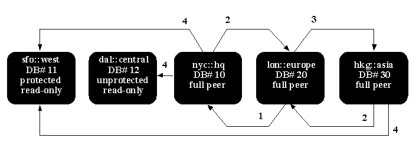Example: R.E.P.’s CDDS 0
The Company’s main CDDS (CDDS 0) is shared by its offices in New York City, San Francisco, Dallas, London, and Hong Kong. New York, London, and Hong Kong are full peers in this CDDS. San Francisco is a protected read-only target, and Dallas is an unprotected read-only target. The following table illustrates the database information on the CDDS Worksheet for this CDDS:
Database Number/Name | Target Type | Server Number |
|---|---|---|
10 nyc::hq | 1 (full peer) | 1 |
11 sfo::west | 2 (protected read-only) | 4 |
12 dal::central | 3 (unprotected read-only) | 4 |
20 lon::europe | 1 (full peer) | 2 |
30 hkg::asia | 1 (full peer) | 3 |
New York acts as the U.S. hub and distributes data to San Francisco, Dallas, and London. London acts as the international hub and sends data to New York and Hong Kong. San Francisco is the U.S. alternate site and has a redundant path from Hong Kong.
The Company’s CDDS Diagram for CDDS 0 looks like this:

The Company’s Propagation Path entries on the CDDS Worksheet for CDDS 0 are listed in the following table:
Originator DB | Local DB | Target DB | Comment |
|---|---|---|---|
10 | 10 | 11 | NYC to SFO |
10 | 10 | 12 | NYC to DAL |
10 | 10 | 20 | NYC to LON |
10 | 20 | 30 | NYC to HKG through LON |
10 | 30 | 11 | NYC to SFO through LON and HKG |
20 | 20 | 10 | LON to NYC |
20 | 20 | 30 | LON to HKG |
20 | 30 | 11 | LON to SFO through HKG |
20 | 10 | 12 | LON to DAL through NYC |
20 | 10 | 11 | LON to SFO through NYC |
30 | 30 | 11 | HKG to SFO |
30 | 30 | 20 | HKG to LON |
30 | 20 | 10 | HKG to NYC through LON |
30 | 10 | 11 | HKG to SFO through LON and NYC |
30 | 10 | 12 | HKG to DAL through LON and NYC |
Because the San Francisco database has a redundant path, it has collisions when the same transaction arrives from both New York and Hong Kong. The Company handles this situation by using the collision mode BenignResolution, which resolves collisions that have the same transaction ID.
Last modified date: 02/26/2025